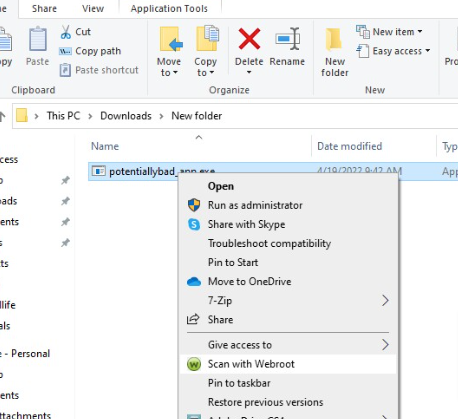Think before you click.
Do not “Double-click” or “open” an attachment unless: It is from someone you know, AND the message makes meaningful reference to all files, AND all files pass virus check with your up-to-date virus checker (many new viruses will appear to come from someone you know). An email with the subject: “Here are the files you requested” is not a meaningful reference to attached files; several trojans and worms use similar generic phrasing when sending themselves to addresses stolen from your own address book.
Always have antivirus protection.
Make sure that you have up-to-date Virus Software on your machine. It’s also a good idea to have spam/virus protection (included with @estreet.com mail and available for activation on any domain name we manage here at E Street including Microsoft 365 email) enabled at the server level such as E Street’s Barracuda Spam and Virus Firewall.
Run a virus check on any files you download off the internet before opening.
Check everything external before use, but if the file is of dubious origin and/or unsolicited just don’t open it at all. After downloading the file right-click the file before opening it and choose to scan the file with your Anti-virus for example with webroot:
Backup your computer.
The most important thing you can do to save hours of time when your computer crashes is to have a backup. Depending how dynamic your computer’s content is, try to backup once a week or at least once a month. Doesn’t really matter how you do your backups–just do them. You can copy your data onto an external drive. See how to do it. You don’t need to go out and spend thousands on backup hardware or software when you can get a zip drive or a backup tape drive for less than $100.
Use an anti-virus program.
There are tons of viruses out there all trying to infect your computer 24/7, and it only takes one to tank your computer or hard drive. If you use a Windows PC, Email, and the Internet (i.e.: share files with other people), and you don’t use a virus checker….. the odds are that you will get a virus in your machine. Always scan floppy disks before you use them! Be sure your virus-checking program is updating constantly (it should be automatically).
Don’t allow active content to run (meaning launch a program or file through a web page) unless you trust the site and the site needs it to do something important and useful to you (e.g. a banking site or a sign-up server). Don’t feel obliged to open every attachment you get in your inbox – be careful!
Never just “switch off” your computer.
Use the “Shut Down” command to let your operating system close open files and quit nicely. If you can, leave it on all the time. Most new computers have a sleep mode and use less electricity than a light bulb when in power savings mode.
Use a surge suppressor.
Never plug your computer into the wall without some sort of surge protection. If you can get one, get an uninterruptible power supply (UPS) with power filtering. If you have bad or “dirty” power, this can help extend the life of your computer.


